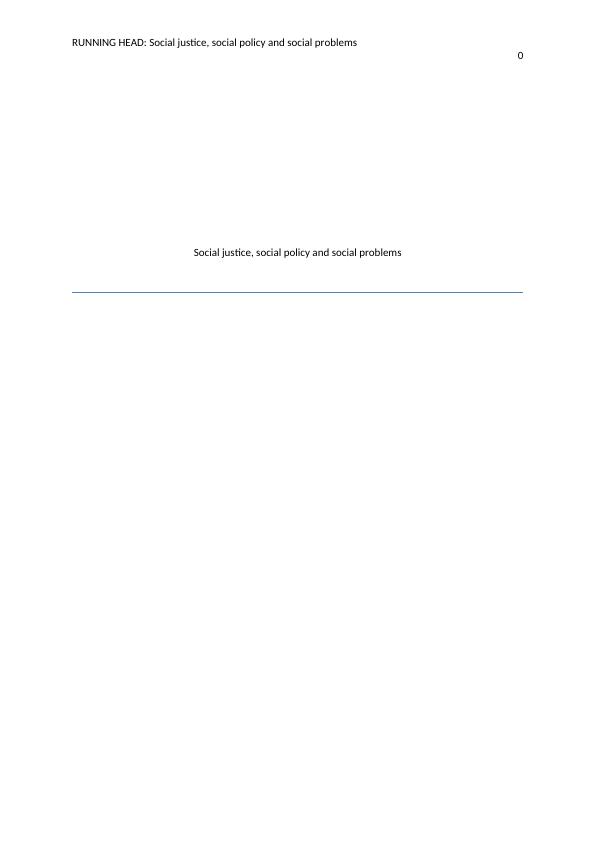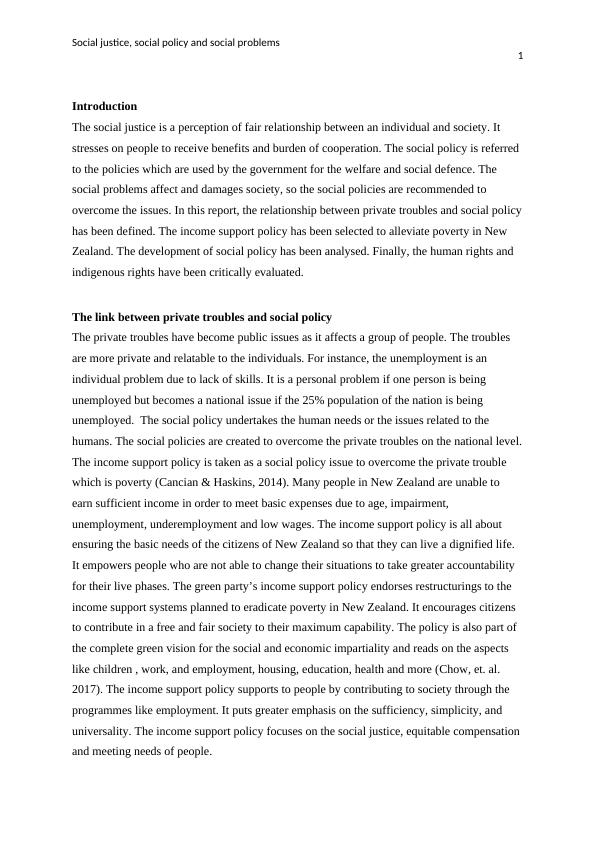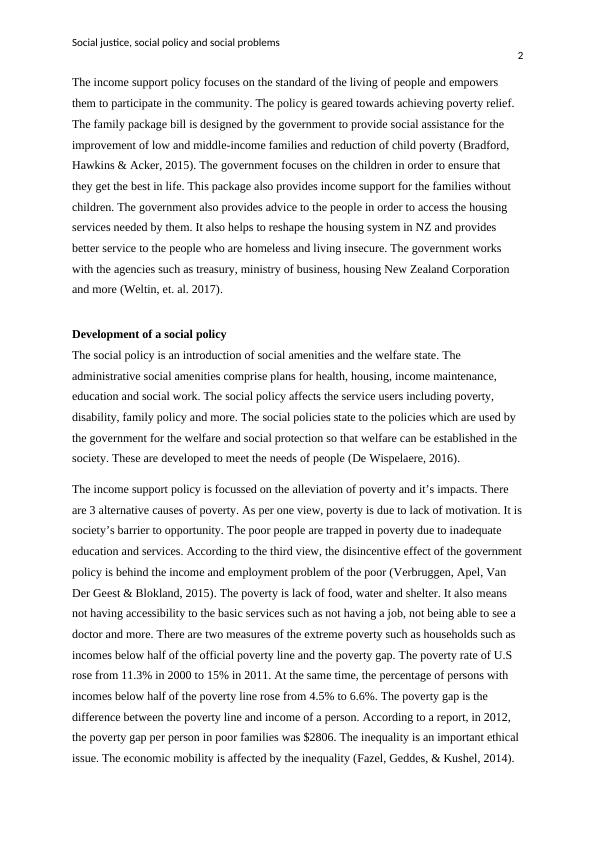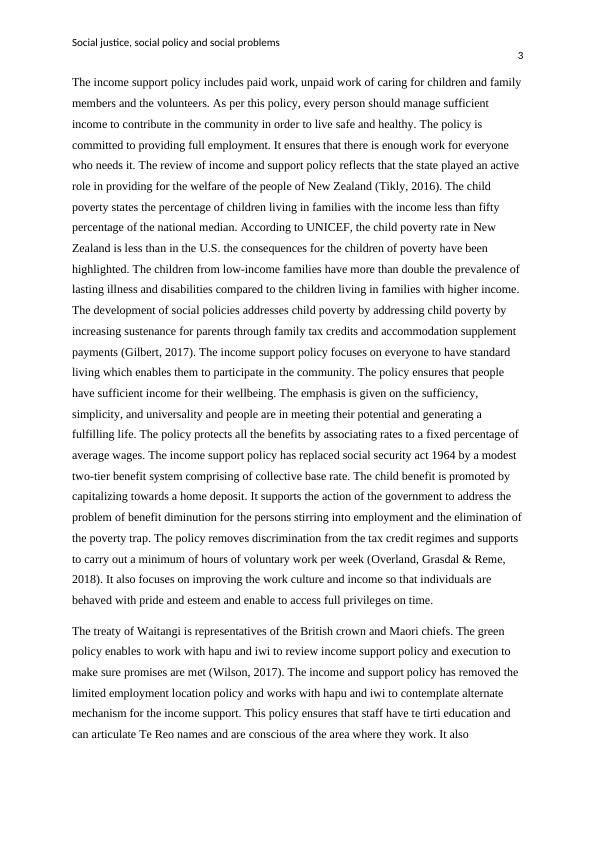Social Justice, Social Policy and Social Problems
Added on 2023-06-10
12 Pages4792 Words103 Views
RUNNING HEAD: Social justice, social policy and social problems
0
Social justice, social policy and social problems
0
Social justice, social policy and social problems

Social justice, social policy and social problems
1
Introduction
The social justice is a perception of fair relationship between an individual and society. It
stresses on people to receive benefits and burden of cooperation. The social policy is referred
to the policies which are used by the government for the welfare and social defence. The
social problems affect and damages society, so the social policies are recommended to
overcome the issues. In this report, the relationship between private troubles and social policy
has been defined. The income support policy has been selected to alleviate poverty in New
Zealand. The development of social policy has been analysed. Finally, the human rights and
indigenous rights have been critically evaluated.
The link between private troubles and social policy
The private troubles have become public issues as it affects a group of people. The troubles
are more private and relatable to the individuals. For instance, the unemployment is an
individual problem due to lack of skills. It is a personal problem if one person is being
unemployed but becomes a national issue if the 25% population of the nation is being
unemployed. The social policy undertakes the human needs or the issues related to the
humans. The social policies are created to overcome the private troubles on the national level.
The income support policy is taken as a social policy issue to overcome the private trouble
which is poverty (Cancian & Haskins, 2014). Many people in New Zealand are unable to
earn sufficient income in order to meet basic expenses due to age, impairment,
unemployment, underemployment and low wages. The income support policy is all about
ensuring the basic needs of the citizens of New Zealand so that they can live a dignified life.
It empowers people who are not able to change their situations to take greater accountability
for their live phases. The green party’s income support policy endorses restructurings to the
income support systems planned to eradicate poverty in New Zealand. It encourages citizens
to contribute in a free and fair society to their maximum capability. The policy is also part of
the complete green vision for the social and economic impartiality and reads on the aspects
like children , work, and employment, housing, education, health and more (Chow, et. al.
2017). The income support policy supports to people by contributing to society through the
programmes like employment. It puts greater emphasis on the sufficiency, simplicity, and
universality. The income support policy focuses on the social justice, equitable compensation
and meeting needs of people.
1
Introduction
The social justice is a perception of fair relationship between an individual and society. It
stresses on people to receive benefits and burden of cooperation. The social policy is referred
to the policies which are used by the government for the welfare and social defence. The
social problems affect and damages society, so the social policies are recommended to
overcome the issues. In this report, the relationship between private troubles and social policy
has been defined. The income support policy has been selected to alleviate poverty in New
Zealand. The development of social policy has been analysed. Finally, the human rights and
indigenous rights have been critically evaluated.
The link between private troubles and social policy
The private troubles have become public issues as it affects a group of people. The troubles
are more private and relatable to the individuals. For instance, the unemployment is an
individual problem due to lack of skills. It is a personal problem if one person is being
unemployed but becomes a national issue if the 25% population of the nation is being
unemployed. The social policy undertakes the human needs or the issues related to the
humans. The social policies are created to overcome the private troubles on the national level.
The income support policy is taken as a social policy issue to overcome the private trouble
which is poverty (Cancian & Haskins, 2014). Many people in New Zealand are unable to
earn sufficient income in order to meet basic expenses due to age, impairment,
unemployment, underemployment and low wages. The income support policy is all about
ensuring the basic needs of the citizens of New Zealand so that they can live a dignified life.
It empowers people who are not able to change their situations to take greater accountability
for their live phases. The green party’s income support policy endorses restructurings to the
income support systems planned to eradicate poverty in New Zealand. It encourages citizens
to contribute in a free and fair society to their maximum capability. The policy is also part of
the complete green vision for the social and economic impartiality and reads on the aspects
like children , work, and employment, housing, education, health and more (Chow, et. al.
2017). The income support policy supports to people by contributing to society through the
programmes like employment. It puts greater emphasis on the sufficiency, simplicity, and
universality. The income support policy focuses on the social justice, equitable compensation
and meeting needs of people.

Social justice, social policy and social problems
2
The income support policy focuses on the standard of the living of people and empowers
them to participate in the community. The policy is geared towards achieving poverty relief.
The family package bill is designed by the government to provide social assistance for the
improvement of low and middle-income families and reduction of child poverty (Bradford,
Hawkins & Acker, 2015). The government focuses on the children in order to ensure that
they get the best in life. This package also provides income support for the families without
children. The government also provides advice to the people in order to access the housing
services needed by them. It also helps to reshape the housing system in NZ and provides
better service to the people who are homeless and living insecure. The government works
with the agencies such as treasury, ministry of business, housing New Zealand Corporation
and more (Weltin, et. al. 2017).
Development of a social policy
The social policy is an introduction of social amenities and the welfare state. The
administrative social amenities comprise plans for health, housing, income maintenance,
education and social work. The social policy affects the service users including poverty,
disability, family policy and more. The social policies state to the policies which are used by
the government for the welfare and social protection so that welfare can be established in the
society. These are developed to meet the needs of people (De Wispelaere, 2016).
The income support policy is focussed on the alleviation of poverty and it’s impacts. There
are 3 alternative causes of poverty. As per one view, poverty is due to lack of motivation. It is
society’s barrier to opportunity. The poor people are trapped in poverty due to inadequate
education and services. According to the third view, the disincentive effect of the government
policy is behind the income and employment problem of the poor (Verbruggen, Apel, Van
Der Geest & Blokland, 2015). The poverty is lack of food, water and shelter. It also means
not having accessibility to the basic services such as not having a job, not being able to see a
doctor and more. There are two measures of the extreme poverty such as households such as
incomes below half of the official poverty line and the poverty gap. The poverty rate of U.S
rose from 11.3% in 2000 to 15% in 2011. At the same time, the percentage of persons with
incomes below half of the poverty line rose from 4.5% to 6.6%. The poverty gap is the
difference between the poverty line and income of a person. According to a report, in 2012,
the poverty gap per person in poor families was $2806. The inequality is an important ethical
issue. The economic mobility is affected by the inequality (Fazel, Geddes, & Kushel, 2014).
2
The income support policy focuses on the standard of the living of people and empowers
them to participate in the community. The policy is geared towards achieving poverty relief.
The family package bill is designed by the government to provide social assistance for the
improvement of low and middle-income families and reduction of child poverty (Bradford,
Hawkins & Acker, 2015). The government focuses on the children in order to ensure that
they get the best in life. This package also provides income support for the families without
children. The government also provides advice to the people in order to access the housing
services needed by them. It also helps to reshape the housing system in NZ and provides
better service to the people who are homeless and living insecure. The government works
with the agencies such as treasury, ministry of business, housing New Zealand Corporation
and more (Weltin, et. al. 2017).
Development of a social policy
The social policy is an introduction of social amenities and the welfare state. The
administrative social amenities comprise plans for health, housing, income maintenance,
education and social work. The social policy affects the service users including poverty,
disability, family policy and more. The social policies state to the policies which are used by
the government for the welfare and social protection so that welfare can be established in the
society. These are developed to meet the needs of people (De Wispelaere, 2016).
The income support policy is focussed on the alleviation of poverty and it’s impacts. There
are 3 alternative causes of poverty. As per one view, poverty is due to lack of motivation. It is
society’s barrier to opportunity. The poor people are trapped in poverty due to inadequate
education and services. According to the third view, the disincentive effect of the government
policy is behind the income and employment problem of the poor (Verbruggen, Apel, Van
Der Geest & Blokland, 2015). The poverty is lack of food, water and shelter. It also means
not having accessibility to the basic services such as not having a job, not being able to see a
doctor and more. There are two measures of the extreme poverty such as households such as
incomes below half of the official poverty line and the poverty gap. The poverty rate of U.S
rose from 11.3% in 2000 to 15% in 2011. At the same time, the percentage of persons with
incomes below half of the poverty line rose from 4.5% to 6.6%. The poverty gap is the
difference between the poverty line and income of a person. According to a report, in 2012,
the poverty gap per person in poor families was $2806. The inequality is an important ethical
issue. The economic mobility is affected by the inequality (Fazel, Geddes, & Kushel, 2014).

Social justice, social policy and social problems
3
The income support policy includes paid work, unpaid work of caring for children and family
members and the volunteers. As per this policy, every person should manage sufficient
income to contribute in the community in order to live safe and healthy. The policy is
committed to providing full employment. It ensures that there is enough work for everyone
who needs it. The review of income and support policy reflects that the state played an active
role in providing for the welfare of the people of New Zealand (Tikly, 2016). The child
poverty states the percentage of children living in families with the income less than fifty
percentage of the national median. According to UNICEF, the child poverty rate in New
Zealand is less than in the U.S. the consequences for the children of poverty have been
highlighted. The children from low-income families have more than double the prevalence of
lasting illness and disabilities compared to the children living in families with higher income.
The development of social policies addresses child poverty by addressing child poverty by
increasing sustenance for parents through family tax credits and accommodation supplement
payments (Gilbert, 2017). The income support policy focuses on everyone to have standard
living which enables them to participate in the community. The policy ensures that people
have sufficient income for their wellbeing. The emphasis is given on the sufficiency,
simplicity, and universality and people are in meeting their potential and generating a
fulfilling life. The policy protects all the benefits by associating rates to a fixed percentage of
average wages. The income support policy has replaced social security act 1964 by a modest
two-tier benefit system comprising of collective base rate. The child benefit is promoted by
capitalizing towards a home deposit. It supports the action of the government to address the
problem of benefit diminution for the persons stirring into employment and the elimination of
the poverty trap. The policy removes discrimination from the tax credit regimes and supports
to carry out a minimum of hours of voluntary work per week (Overland, Grasdal & Reme,
2018). It also focuses on improving the work culture and income so that individuals are
behaved with pride and esteem and enable to access full privileges on time.
The treaty of Waitangi is representatives of the British crown and Maori chiefs. The green
policy enables to work with hapu and iwi to review income support policy and execution to
make sure promises are met (Wilson, 2017). The income and support policy has removed the
limited employment location policy and works with hapu and iwi to contemplate alternate
mechanism for the income support. This policy ensures that staff have te tirti education and
can articulate Te Reo names and are conscious of the area where they work. It also
3
The income support policy includes paid work, unpaid work of caring for children and family
members and the volunteers. As per this policy, every person should manage sufficient
income to contribute in the community in order to live safe and healthy. The policy is
committed to providing full employment. It ensures that there is enough work for everyone
who needs it. The review of income and support policy reflects that the state played an active
role in providing for the welfare of the people of New Zealand (Tikly, 2016). The child
poverty states the percentage of children living in families with the income less than fifty
percentage of the national median. According to UNICEF, the child poverty rate in New
Zealand is less than in the U.S. the consequences for the children of poverty have been
highlighted. The children from low-income families have more than double the prevalence of
lasting illness and disabilities compared to the children living in families with higher income.
The development of social policies addresses child poverty by addressing child poverty by
increasing sustenance for parents through family tax credits and accommodation supplement
payments (Gilbert, 2017). The income support policy focuses on everyone to have standard
living which enables them to participate in the community. The policy ensures that people
have sufficient income for their wellbeing. The emphasis is given on the sufficiency,
simplicity, and universality and people are in meeting their potential and generating a
fulfilling life. The policy protects all the benefits by associating rates to a fixed percentage of
average wages. The income support policy has replaced social security act 1964 by a modest
two-tier benefit system comprising of collective base rate. The child benefit is promoted by
capitalizing towards a home deposit. It supports the action of the government to address the
problem of benefit diminution for the persons stirring into employment and the elimination of
the poverty trap. The policy removes discrimination from the tax credit regimes and supports
to carry out a minimum of hours of voluntary work per week (Overland, Grasdal & Reme,
2018). It also focuses on improving the work culture and income so that individuals are
behaved with pride and esteem and enable to access full privileges on time.
The treaty of Waitangi is representatives of the British crown and Maori chiefs. The green
policy enables to work with hapu and iwi to review income support policy and execution to
make sure promises are met (Wilson, 2017). The income and support policy has removed the
limited employment location policy and works with hapu and iwi to contemplate alternate
mechanism for the income support. This policy ensures that staff have te tirti education and
can articulate Te Reo names and are conscious of the area where they work. It also

End of preview
Want to access all the pages? Upload your documents or become a member.
Related Documents
Migration Unemployment: Case Study Analysis and Solutionslg...
|5
|1703
|26
Development of Social Policy on Poverty and Attitudes to Poverty from the 19th Century to Present Daylg...
|8
|2426
|308
Social Entrepreneurship: Impact on Society and Recommendationslg...
|8
|1868
|249
An Introduction to Social Policy (Distinction Criteria)lg...
|8
|2273
|429
The poverty involves more than lack of productivelg...
|10
|2063
|38
Australian Society, Systems and Policies: Poverty in Australialg...
|10
|1710
|334
